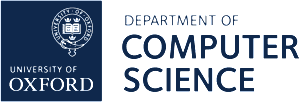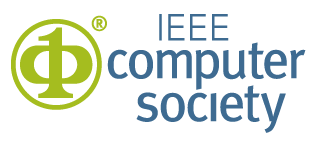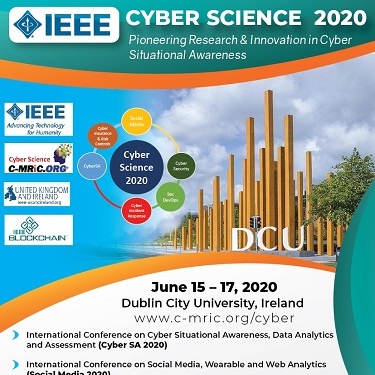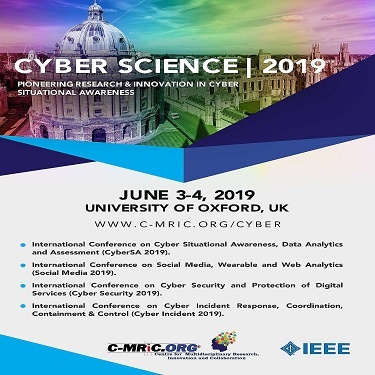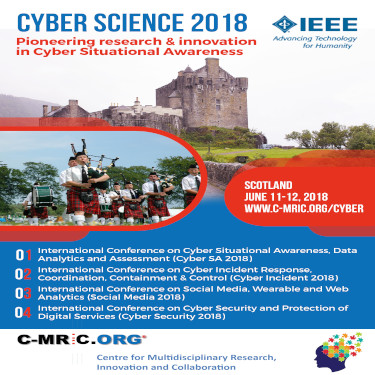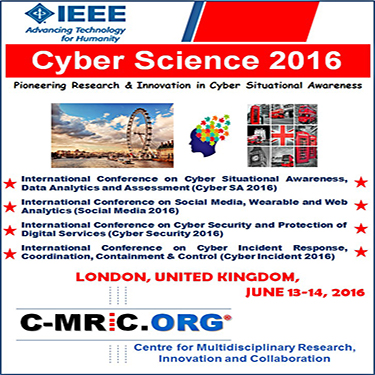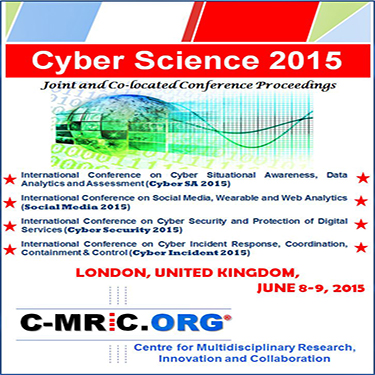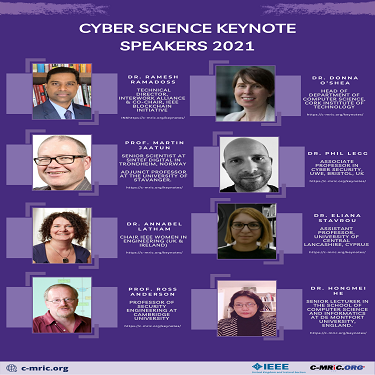
Cyber Science
20-21 June 2022 // Cardiff Metropolitan University, Wales
Theme: Ethical and Responsible use of AI
The deadline for submission is 28th February 2022.
The International Conference on Cybersecurity, Situational Awareness and Social Media (Cyber Science 2022) is a multidisciplinary conference. It brings academics, researchers, practitioners and participants together to share and discuss new and emerging ideas, concepts and research outcomes. The conference focuses in advancing the principles, methods and applications of cybersecurity, situational awareness and social media.
Cyber Science 2022 invites participants to submit original papers that encompass principles, concepts, analysis, design, methods and applications of cybersecurity, situational awareness and social media.
All submitted papers will be independently peer-reviewed, and accepted papers must be registered and presented at the conference in order to be included in the conference proceedings.
The conference proceedings will be submitted for consideration for publishing in reputable bibliographic indexes e.g.,, DBLP etc.
As a yearly conference, the intention is to hold the conference at various locations around the world. The first three Cyber Science events were held in London, followed by Glasgow, Scotland, then the University of Oxford, UK. The 2020 and 2021 editions of the conference were both held at the Dublin City University, Dublin, Ireland.
Cyber Science 2022 will be a hybrid (on-site and virtual) event due to the COVID-19 pandemic, at Cardiff Metropolitan University, Wales on June 20-21, 2022, and co-organised by Cardiff School of Technologies (CST) and Cardiff Metropolitan University.
The conference will be a hybrid event (comprising on-site and virtual attendees) featuring notable keynote speakers from industry, academia, and government at the 2-day event. These experts will discuss topical and emerging topics ranging from Ethical and Responsible use of Artificial Intelligence (AI), Cyber Insurance, Cyber Situational Awareness, Resilience and Government Security to Blockchain Regulation & Environmental, Social and Governance (ESG).
In addition, the 2-day event will hold multiple plenary sessions to foster social interaction and engagement from participants. There will be group photos, social evening-drinks and dinner.
Cardiff is a beautiful city with vast cultural heritage. I encourage you to take this opportunity to submit your work, register, attend, network and learn about latest cyber research and innovative topics.
We look forward to meeting you in Cardiff, in person or virtually.
Conference Publication
Cyber Science 2022 will be published by Springer.

Proceedings of all accepted and presented papers at the conference will be published in Springer Proceedings in Complexity book series.

The papers will be submitted for indexing by DBLP, Scopus and Semantic Scholar.


Keynote Speakers
Professor Bill Buchanan OBE – Professor, School of Computing, Edinburgh Napier University, Scotland
Navrina Singh – Founder & CEO at Credo AI, USA
John Davies MBE – Co-founder & Chair of Cyber Wales, UK
Dr Maria Bada – Lecturer in Psychology, Queen Mary University, London, UK
Topics
Cyber Situational Awareness
Topics include but not limited to: Situational Awareness Assessments, Social Media Analysis, Collaborative Defense Approach, Cyber Situational Awareness Tools & Techniques, Network Situational Awareness, Human Factor Cognitive, National and Critical Infrastructure Security Issues, Situation Awareness in Military Operations, Cyber Situational Analytics, Cyber Situational Awareness Frameworks, Fusion Centres, Situational Awareness Applications, Cyber Situational Awareness Designs, Solutions and Services, Situational Awareness Training, Cyber Attack Scenarios, Situation-Aware and Context-Aware Network Applications, Artificial Intelligence (AI), Machine Learning & Deep Learning, and Ethics, Transparency and Trustworthy AI.
Artificial Intelligence & Robotics
Topics include but not limited to: Predictive Data Analytics for Situation Awareness, Machine Learning for Cyber Situation Awareness, Artificial Intelligence for Cyber Situation Awareness, Artificial Intelligence & Machine Learning for Cybersecurity, Autonomous & Self-driving, Self-Healing, Domestic Assistance, Autonomous Healthcare and Assistance, Industrial Manufacturing Robotics, Search and Rescue Operations.
Human Factor Cognition
Topics include but not limited to: Workload, Perception, Stress, Knowledge, Training and Expertise, Risk Assessment and Decision Making, Forecasting and Prediction, Operator SA & Team SA, Knowledge, Skills and Abilities (KSA).
Blockchain Technologies
Topics include but not limited to: Cryptocurrency, Regulation of Cryptocurrencies, Mechanisms to address Environmental, Social and Governance (ESG) concerns with Blockchain Technologies, Bitcoin & Bit-everything, Blockchain in Manufacturing, Blockchain in Banking & Financial Systems, Blockchain in Aviation, Blockchain in Pharmaceuticals, Blockchain in IoT, Blockchain in Defence, Blockchain in Cybersecurity Operations, Blockchain in Publications, Blockchain in Smart Contracts, Blockchain in the Energy Sector & Utilities.
STEM & Cyber Security Education
Topics include but not limited to: Cyber Security in childhood education, Code – Teaching Coding for Kids, Teens and Colleges, Secure by Code, Secure by Design, Secure by Default, Immersive learning for Cyber, Metaverse and Cybersecurity Education.
Social Media, Wearable and Web Analytics
Topics include but not limited to: Advances in Social Media, Trust and privacy in Social Media, Social Medial Big Data Analysis, Social Network Analysis, Social Media Technologies, Advances in Wearable, Wearable in e-Health, Wearable in Fitness, Wearable and Security, Trust and Privacy in Wearable, Wearable Technologies, Economic Importance of Wearable, Web Analytics & Cyber Intelligence, Advances in Web Analytics Web Analytics for Law Enforcement and Security Monitoring, Legal Issues of Web Analytics, Law, Legislation and Compliance, Security, Trust, Privacy, Web Analytics for Business Intelligence, Responsible use of Social Media, Geolocation Content-Aware analytics, Digital Content, Customer-centric Analysis, Social Network Analysis, Cyber Intelligence.
Cyber Security
Topics include but not limited to: Cyber Security, App Security, Mobile Security, Wireless & Sensor Network Security, Software Coding Security, Security Operations Centres, Digital Trust and Reputation, Geographical Location (IP Geolocation) and Cyber Travel, Geospatial Intelligence Networks (Centralised, Distributed & Hybrid), Policy, Legal, Legislation & Compliance, Security Standardisation, Law, Legal and Ethics, Digital Services, Web Services, Cloud Computing, Intrusion Detection Systems, Protection of Digital Services, Security, Trust, Privacy, Security in Online Gaming Systems, Security in e-Government and Electoral Systems, Content Security, Protection of Public Online Content Distribution Systems, Secure practices, processes and procedures in Public Online Services, Cryptography, Digital Forensics and Investigations, HoneyPots and Honey Nets, Critical National Infrastructures (CNIs) and Blockchain Technologies.
Application Container Platform Security
Topics include but not limited to: ACP, Container Technologies, Security Concerns Associated with Container Technologies, Apps, Cultural and Technical Processes for Managing Containers & Apps, Microservices, Kubernetes, Docker, Cloud Computing, Virtualisation (Network, OS, Container & Apps), DevOps, API, HostOS, Container Technology Architecture, Approaches to Management, Maintenance and Processing of Containers, Apps and HostOS, CI/CD, Risks & Issues, OWASP, Open Web Application Security.
Cyber Incident Response
Topics include but not limited to: Cyber Incident Analysis, Cyber Incident Correlation and Assessment, Coordination, Containment, Root Cause Analysis (RCA), Cyber Incident Management, Emergence Services, Preparedness & Readiness, Human in the Loop, Preparedness & Readiness, Training, Processes and Procedures, Policy and Standards, Emergency Services, Forensic Readiness and Investigations, Cyber Incident Notification and Announcements, Cyber Incident Management Tool, Framework and Methodology, Expertise, Skills, Knowledge and Resource, Maturity Model and Goal Setting, Certification and Accreditation, Cyber Incident Responders, Incident Response Organisation, Investigation Techniques – Rule-Based Systems & Expert Systems, Adaptive Learning Systems & Predictive Systems, The use of Biometrics to aid Forensic Investigations, Speak, audio and voice Recognition for forensics, Correlation and cross-correlation for Incident Analysis, Cross-Domain Analysis, Training, Processes and Procedures, Policy and Standards, Emergency Services, Chain of Custody, Forensic Readiness and Investigations, Cyber Incident Notification and Announcements, Cyber Incident Management Tool, Standardisation, Framework and Methodology, Expertise, Skills, Knowledge and Resource, Maturity Model and Goal Setting, Certification and Accreditation, Memberships to Cyber Incident Responders, Incident Response Organisation.
Paper Submission
The deadline for all submissions is 28th February 2022.
Please prepare your paper according to Springer Author’s guidelines. All accepted papers must complete a copyright form.
Authors must use the online submission system hosted by EasyChair Conference System to submit their papers. If you don’t have an EasyChair account you will need to create one and then login in order to submit your papers. Please read the Submission Instructions before submitting your work in the system.
Submission Instructions
Both long (25 pages max., roughly 25,000 words) and short (14 pages max., roughly 14,000 words) paper submissions should be written in English and be submitted electronically via the EasyChair conference portal. Submission file formats are PDF and Microsoft Word using the.
Important Dates
- Full Paper (Short / Long) Submissions – 28 February 2022
- Notification of Full Paper/Abstract / Special Track Acceptance/Rejection – April 26, 2022
- Camera Ready Paper Due – May 14, 2022
- Participants Registration – March 26 – May 31, 2022
- Conference Date – June 20 – 21, 2022
Committee
Conference Chairs
Arnau Erola – Cyber Security Centre, Department of Computer Science, University of Oxford, Oxford, UK
Aunshul Rege – Temple University, Pennsylvania, USA
Cyril Onwubiko – Centre for Multidisciplinary Research, Innovation and Collaboration, UK
Hanan Yousry Hindy –Computer Science Department, Faculty of Comuter and Information Sciences, Ain Shams University
Martin Gilje Jaatun – University of Stavanger, Norway
Pierangelo Rosati – Dublin City University, Dublin, Ireland
Xavier Bellekens – Lupovis
Publicity Chairs
Eckhard Pfluegel – Faculty of Science, Engineering and Computing, Kingston University, UK
Joe Burton – Political Science and Public Policy Programme, The University of Waikato, New Zealand
Kevin Curran – Faculty of Computing and Engineering, Ulster University, Northern Ireland, UK
Phil Legg – University of the West of England, UK
Uri Blumenthal – MIT Lincoln Laboratory, MIT, USA
Organising Committee Chairs
Abdelrahman Abuarqoub – Cardiff School of Technologies (CST), Cardiff Metropolitan University, Wales, UK
Arslan Ahmad – Cardiff School of Technologies (CST), Cardiff Metropolitan University, Wales, UK
Chaminda Hewage – Cardiff School of Technologies (CST), Cardiff Metropolitan University, Wales, UK
Elochukwu Ukwandu – Cardiff School of Technologies (CST), Cardiff Metropolitan University, Wales, UK
Fiona Carroll – Cardiff School of Technologies (CST), Cardiff Metropolitan University, Wales, UK
Liqaa Nawaf – Cardiff School of Technologies (CST), Cardiff Metropolitan University, Wales, UK
Mohammad Safar – Cardiff School of Technologies (CST), Cardiff Metropolitan University, Wales, UK
Tahir Sheikh Bakhsh – Cardiff School of Technologies (CST), Cardiff Metropolitan University, Wales, UK
Thanuja Mallikarachchi – Cardiff School of Technologies (CST), Cardiff Metropolitan University, Wales, UK
Programme Committee
Amin Hosseinian-Far – Business Systems and Operations , University of Northampton, UK
Antonis Mouhtaropoulos – Department of Computer Science, University of Warwick, Coventry, UK
Arghir-Nicolae Moldovan – National College of Ireland (NCIRL), Ireland
Avishek Nag – University College Dublin, Ireland
Bertrand Venard – Audencia, OII, University of Oxford, UK
Boniface K. Alese – Department of Computer Science, Federal University of Technology, Akure, Nigeria
Carlos A. Perez Delgado – School of Computing, University of Kent, UK
Charles Clarke – Kingston University, London, UK
Ciza Thomas – College of Engineering, India
Dimitris Kavallieros – Center for Security Studies (KEMEA), Greece
Domhnall Carlin – Queen’s University (QUB), Belfast, Northern Ireland, UK
Edwin K. Kairu – Carnegie Mellon University, CMU Africa
Eliana Stavrou – Computing Department, UCLan Cyprus, Larnaca, Cyprus
Elisavet Konstantinou – University of the Aegean, Greece
Fatih Kurugollu – Cyber Security, University of Derby, Derby, UK
Felix Heine – Hannover University of Applied Sciences, Germany
Florian Skopik – Cyber Security Research, AIT Austrian Institute of Technology, Austria
Francisco J Aparicio Navarro, Cyber Technology Institute, De Montfort University, UK
Georgios Kambourakis – University of the Aegean, Greece
Gerardo I. Simari – Universidad Nacional del Sur in Bahia Blanca and CONICET, Argentina
Harin Sellahewa – School of Computing, The University of Buckingham, UK
Hasan Yasar – Division of the Software Engineering Institute, Carnegie Mellon University, USA
Hayretdin Bahsi – Center for Digital Forensics and Cyber Security, Tallin University of Technology, Estonia
He (Mary) Hongmei – School of Computer Science and Informatics at De Montfort University, UK
Huiyu Zhou – Queen’s University Belfast, Belfast, UK
Ivan Silva – Instituto Metrópole Digital (IMD), Federal University of Rio Grande do Norte (UFRN), Brazil
Jason Nurse – University of Kent, UK
Jens Myrup Pedersen – University of Aalborg, Denmark
Jingyue Li – Department of Computer Science, Faculty of Information Technology and Electrical Engineering, NTNU, Norway
Programme Committee
Joe Burton – Political Science and Public Policy Programme, The University of Waikato, New Zealand
Kevin Curran – Faculty of Computing and Engineering, Ulster University, Northern Ireland, UK
Kumar Bandeli – Data Science, Walmart Inc., USA
Lakshmi Prayaga – Department of Applied Science, Technology and Administration, University of West Florida, USA
Lynsay Shepherd – Abertay University, Dundee, Scotland, UK
Maria Bada – Queen Mary University of London, UK
Marios Anagnostopoulos – University of the Aegean, Greece
Michal Chorasm – Telecommunications and Computer Science, University of Science and Technology (UTP), Bydgoszcz, Poland
Michalis Diamantaris – Institute of Computer Science, Foundation for Research and Technology (FORTH), Greece
Nicholas Savage – Portsmouth University, UK
Palvi Aggarwal – Carnegie Mellon University (CMU), USA
Panagiotis Trimintzios – Cyber Crisis Cooperation & Exercises Team Operational Security, ENISA, Europe
Petra Leimich – Edinburgh Napier University, Edinburgh, Scotland, UK
Phil Legg – University of the West of England, UK
Philipp Reinecke – Cardiff University, Wales, UK
Pierre Parrend – ECAM Strasbourg-Europe, France
Ruth Ikwu – Cardiff University, Wales, UK
Sean Mckeown – Edinburgh Napier University, Scotland, UK
Shamal Faily – Cyber Security Research group (BUCSR), Bournemouth University, UK
Stefanos Gritzalis – University of the Aegean, Greece
Suleiman Yerima – Cyber Security, De Montfort University, UK
Thaddeus Eze – Computer Science Department, University of Chester, UK
Thomas Pasquier – Department of Computer Science, University of Bristol, UK
Thomas T Y Win – School of Business & Technology, University of Gloucestershire, UK
Tim D Williams – University of Reading, Reading, UK
Ulrik Franke – Software and Systems Engineering Laboratory (SSE), RI.SE, Sweden
Uri Blumenthal – MIT Lincoln Laboratory, MIT, USA
Uwe Glässer – School of Computing Science, Simon Fraser University, Canada
Vanderson de Souza Sampaio – Fundação de Medicina Tropical Dr. Heitor Vieira Dourado, Brazil
Varun Dutt – Indian Institute of Technology (IIT) Mandi, India
Sponsorship
The primary audience for the Cyber Science conference are industry professionals, CISOs CxO, scholars, researchers and academics working in this fast evolving and emerging field of discipline. Practitioners and managers working in information technology and information security across all industries, especially Financial Institutions, Banks in particular, Government Sector, Engineering, Rail and Retail & Corporate would vastly improve their knowledge and understanding of critical human and social aspects of situation awareness, computer network defence, information security and Cyber incident response. CTOs, SROs and DGs will also find this conference a very helpful and practical resource.
Our previous conferences have attracted people from all industries, ranging from academia, financial services sector, government and defence agencies from the UK, Europe, America, and Asia.
Some of the benefits to our sponsors include:
Firstly, there are no competing conferences in this unique and specialist area, especially those focusing on the application of situation awareness to Cyber Security (CS), Cyber Physical Systems (CPS), and Cyber Incident Response. The fusion of these unique and multidisciplinary areas into one that serves a wider audience makes this conference a sought after event. No wonder companies and institutions in the USA, UK and Europe send their representatives to attend this conference. So this offers a cutting edge and fast reaching forum for organisations to learn, network and promote their services and brand.
Secondly, sponsors are offered the opportunity to influence and contribute to topics and areas of interest they may wish talks and seminars to focus. For example, there are plenary sessions that focus on audience engagement through which discussions happen and areas of interest for future conferences are put forward and collated.





